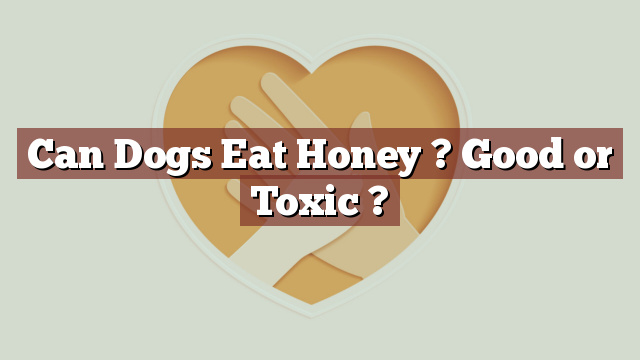Can Dogs Eat Honey? Good or Toxic?
Knowing which foods are safe for our furry friends is essential for their overall well-being. One such food that often raises questions is honey. While it is a natural and delicious sweetener for humans, can dogs safely consume honey? Let’s explore the nutritional value of honey for dogs and whether it is safe or toxic for them.
Nutritional Value of Honey for Dogs
Honey is a natural product made by bees from floral nectar. It is packed with essential nutrients such as vitamins, minerals, and antioxidants. These beneficial components make honey a potentially valuable addition to a dog’s diet. Some of the key nutrients found in honey include vitamin C, vitamin B complex, calcium, potassium, and iron. Additionally, honey contains trace amounts of pollen, which some believe can help strengthen a dog’s immune system.
Can Dogs Eat Honey? Is it Safe or Toxic?
Yes, dogs can eat honey. In fact, it is considered safe for most dogs to consume honey in moderation. However, it is crucial to note that not all dogs react the same way to honey, just like with any other food. Some dogs may have specific allergies or sensitivities, which could result in adverse reactions when consuming honey. Therefore, it is always recommended to introduce honey gradually into your dog’s diet and monitor their response carefully.
Scientific and veterinary experts generally agree that honey poses no significant toxicity risks for dogs. However, it is important to avoid feeding honey to puppies under one year old or dogs with compromised immune systems, as they may be more susceptible to potential bacterial contamination that can be present in raw honey.
Potential Risks and Benefits of Feeding Honey to Dogs
While honey is generally safe for dogs, it is crucial to be aware of potential risks and benefits associated with its consumption. One potential risk is the high sugar content in honey, which can lead to weight gain, dental problems, or even diabetes if fed excessively. Therefore, it is essential to offer honey as an occasional treat rather than a daily staple in your dog’s diet.
On the other hand, honey offers several potential benefits for dogs. Its antibacterial and antifungal properties can help soothe and heal minor skin irritations or wounds when applied topically. Additionally, some pet owners believe that honey can assist in alleviating allergies or coughing due to its potential immunomodulatory properties. However, more research is needed to support these claims conclusively.
What to Do if Your Dog Eats Honey
If your dog accidentally consumes honey, there is generally no cause for alarm. However, if you notice any unusual symptoms such as diarrhea, vomiting, or signs of an allergic reaction, it is recommended to contact your veterinarian. They can provide professional guidance and advice tailored to your dog’s specific needs.
Conclusion: Honey in Moderation can be Safe and Beneficial for Dogs
In conclusion, dogs can eat honey in moderation, and it can provide them with some nutritional benefits. Honey is generally safe for most dogs and can be a healthy addition to their diet. However, it is essential to introduce honey slowly, monitor any potential adverse reactions, and avoid feeding it to young puppies or dogs with compromised immune systems. As always, consulting with a veterinarian before making any significant dietary changes for your dog is advisable. By following these guidelines, you can ensure that your furry friend can enjoy the occasional taste of honey safely.
Thank you for investing your time in exploring [page_title] on Can-Eat.org. Our goal is to provide readers like you with thorough and reliable information about various dietary topics. Each article, including [page_title], stems from diligent research and a passion for understanding the nuances of our food choices. We believe that knowledge is a vital step towards making informed and healthy decisions. However, while "[page_title]" sheds light on its specific topic, it's crucial to remember that everyone's body reacts differently to foods and dietary changes. What might be beneficial for one person could have different effects on another. Before you consider integrating suggestions or insights from "[page_title]" into your diet, it's always wise to consult with a nutritionist or healthcare professional. Their specialized knowledge ensures that you're making choices best suited to your individual health needs. As you navigate [page_title], be mindful of potential allergies, intolerances, or unique dietary requirements you may have. No singular article can capture the vast diversity of human health, and individualized guidance is invaluable. The content provided in [page_title] serves as a general guide. It is not, by any means, a substitute for personalized medical or nutritional advice. Your health should always be the top priority, and professional guidance is the best path forward. In your journey towards a balanced and nutritious lifestyle, we hope that [page_title] serves as a helpful stepping stone. Remember, informed decisions lead to healthier outcomes. Thank you for trusting Can-Eat.org. Continue exploring, learning, and prioritizing your health. Cheers to a well-informed and healthier future!

